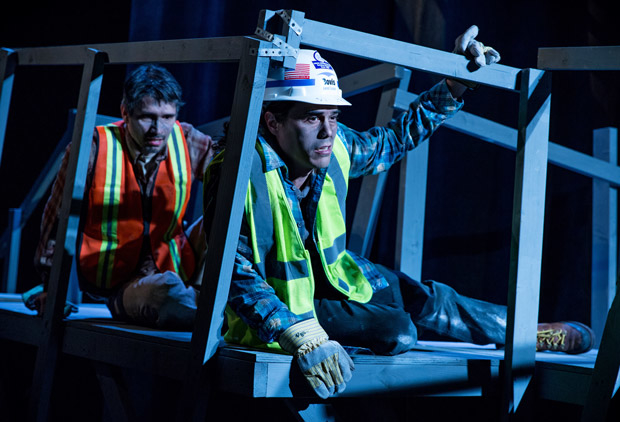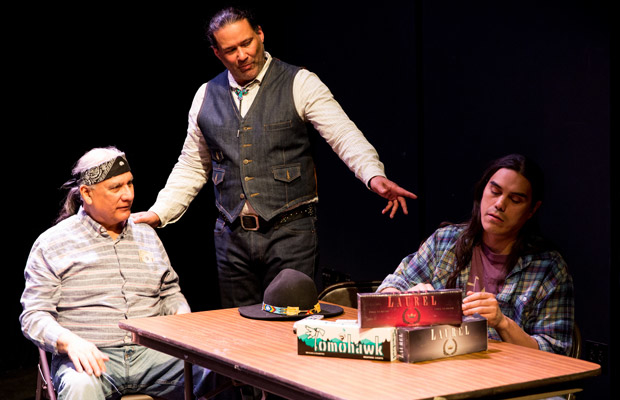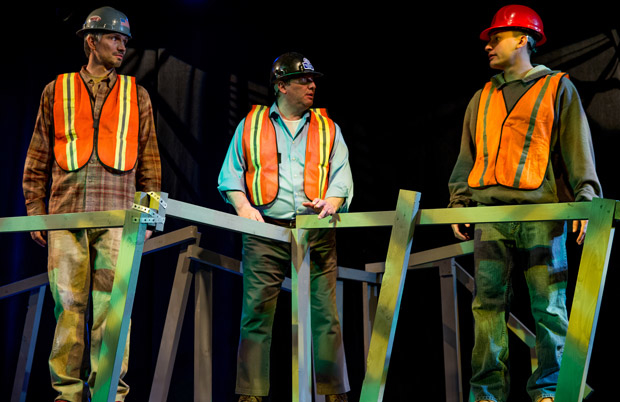Mangled Beams Looks at What It Means to Be an American (Indian)

(© Isaiah Tanenbaum)
There's a quietly stunning sequence at the beginning of Mangled Beams, a world-premiere play by Dawn Jamieson at the A.R.T. / New York Theatres. A man in jeans and a T-shirt underneath a plaid button-down wanders around the stage, house lights still up. He plops down at a folding table and starts leafing through a newsprint magazine. Another man in street clothes enters, sits on a bench, and picks up a second paper. No words are spoken for several minutes, and none need be. There's a beauty to this uneventfulness that feels like life. Then the characters open their mouths, and the sublime mundanity devolves into melodrama.
These two men, Brad and Greg, are Native American ironworkers waiting for jobs at a union hall in New York City. They've been there for weeks because the foreman, Sal, who soon ambles in, is a racist who'd rather assign work to a "wop" or a "spic" than a "red man." But that doesn't stop him from taking bribes from Jess, a Mohawk who uses the hall as a base for his cigarette-smuggling operation — or from Dave, Brad's younger brother, who's on parole and without a union card.
The plot thickens as other characters arrive at the union hall. Greg's girlfriend, Becky — who also happens to be Dave's ex and Brad's niece — shows up because she misses him. Greg's dad, a smuggler like Jess, stops by to make a "delivery" and wheedle his son. Even Fern, Brad's wife and a local radio reporter, comes along. She's not there to comfort her husband, whose alcoholism she's fed up with, but to interview Greg about workplace discrimination against Native Americans.

(© Isaiah Tanenbaum)
So many issues are swirling among these characters — Brad's defeatedness; the love triangle connecting Greg, Becky, and Dave; the animosity between Sal and everyone else — that nothing short of a miracle could resolve all of them. Instead, audiences get a catastrophe: the 9/11 attacks on the World Trade Center.
Suddenly, the folding tables turn. The Native American ironworkers are given work because the need for emergency responders is so great. Sal comes to appreciate Brad and Dave as the three of them clear rubble together. Greg shows himself an opportunist, more interested in getting press coverage than helping Jess, who gets impaled on a spike while doing cleanup work. Dave, conversely, proves himself a hero by saving Jess and making Becky's decision about whom to choose a lot easier. Brad makes a heroic rescue of his own and, in a final flourish of virtue, triumphs over his alcoholism.
Jamieson and director Christen Omantra Callahan are trying to tell a story about Native Americans as Americans, about what the destruction of a national landmark means for a marginalized people who helped build it. As one of Jamieson's characters puts it, "This is an opportunity for us to help people who never gave a sh*t about us."
The difficulty is that her characters are less like people than parts in a theatrical machine. Brad is a dormant hero who just needs a chance to redeem himself; Greg is a self-serving villain waiting to be revealed. There's not one but two calamities (three if you count 9/11) that result in relationship transformations, including Brad and Dave's reconciliation and Greg's ostracization. And then there are the women, as steady in their goodness as the men are variable in their imperfections.

(© Isaiah Tanenbaum)
Big plaudits, then, to the performers who find personality amid the plot devices. Mike Pirozzi makes a convincing, if distasteful, slimeball as Sal; Erin Kelley's Fern is equally convincing as a loving wife who's run out of patience. As Becky, Maeve Crispi's stage presence compensates for some awkward line deliveries. Other cast members struggle with everything from emoting to remembering their cues.
The design elements are also a mixed bag. Z Worthington gets the ambient traffic noises right; you can hardly tell whether they're coming from outside the union hall or from outside the theater. The costumes, by Kyle LeMaire, are simple but sufficient: street clothes and the occasional bolo tie in Act 1, with hard hats and safety vests added in Act 2. Set designer Dedalus Wainwright knows how to furnish a waiting room, but his wooden walkway is too wide to pass as a skyscraper beam and too long for a crane basket, both of which purposes it's meant to serve. Dave looks more like he's hanging onto a porch railing than dangling above a 250-foot drop when he falls out of the basket.
Brad may be able to save his brother, but he can't save this production. Neither can Pirozzi, Kelley, Worthington, or anyone else. There's a story worth telling at the core of this play about identity and conflicted patriotism. Too bad it's been mangled.










